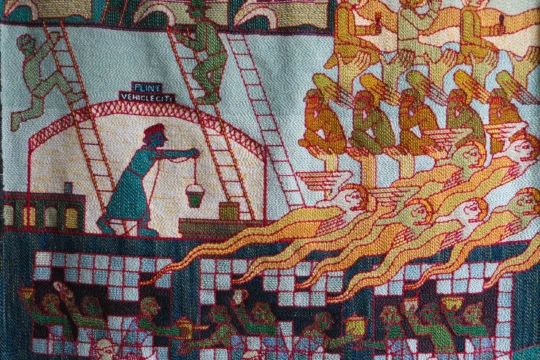
On November 4, the Frist Center for the Visual Arts opened a new exhibition of paintings by Nashville-based film director, screenwriter, and artist Harmony Korine. Korine is known around the world for critically acclaimed films like Kids (1995), Gummo (1997), and Spring Breakers (2013). As an artist, he is represented by none other than Gagosian Gallery. On view through January 15, “Shadows and Loops” features a dozen large-scale paintings created over the past two years.
On the fence about his work after seeing the show, I attended the public talk between Korine and curator Mark Scala at the Frist Center Auditorium on November 10. I’d hoped that he’d say something about the work that might help me gain some insight or perspective that I was missing. Upon first look, Korine’s paintings—mostly abstract patterns or matte collages featuring vaguely creepy men—fell flat and displayed little to no technical prowess or compositional consideration. Scash Bridger appears to be just a poorly printed image of a painting that’s been affixed onto a large canvas. Standing in front of the works, the only word that came to mind was slapdash. As an art writer, this happens to me often: I don’t initially connect with an artist’s work, but then I have a conversation with the artist or read a statement, and suddenly I realize it’s actually kind of brilliant. While some art critics don’t put a lot of stock in the artist’s intent, I do. So I was hoping an epiphany like that might happen with Korine’s paintings. However, what I learned from the talk was that my initial feelings were dead on: there’s just not much there.

During the talk, he said he doesn’t think about why he makes art, or what it might convey, nor does he bother with honing any sort of technique. He doesn’t think about anything. When asked questions about his work, he dodged them all with answers like “I don’t know what I’m doing” and “I just do what feels right.”
Scala did his damnedest to eke out something worthwhile from the conversation—something of value the audience could take home. He came up empty-handed. For every intelligent observation or thoughtful question Scala posed, Korine batted it down with a half-witted platitude that was supposed to pass as an answer.
“I don’t really ask myself anything,” Korine said. “I don’t really know anything about myself. I don’t want to know. I really don’t care, I just show up.”

He apparently thinks that his celebrity status is enough to make the work compelling. That he’s so innately talented he doesn’t have to think about it. This kind of bowing out, this blasé pompous attitude, breaks my heart. It really does. It is a glaring cop-out to tout one’s utter lack of self-awareness and introspection, to say one can’t be bothered to try or exert effort, that one just “shows up.” That isn’t what the art world is supposed to be about. That’s what corporate America is about, what reality television is about, what Walmart is about, what social injustice is about, and racism and sexism and everything that sucks about the world we live in. You know what? Fuck that.
In an hour-long conversation, he said virtually nothing that was of any value to the people who decided to devote time out of their night in the pursuit of art. He did, however, crack some jokes and explain to an almost entirely local audience that he had never made an effort to go to a Nashville art gallery and “had never seen one Nashville artist.” Cool, brah. And while I know what he said is not true, it’s a lousy thing to say to your community. He knows and has worked with plenty of artists here like Patrick DeGuira, Brent Stewart, and Zack Rafuls, who was his studio assistant in 2014, to name a few.

In the audience Q&A, a young man stated that he was lifelong fan of Korine’s work and asked a specific question about the making of Spring Breakers, his “girls gone scarily wild” feature film starring James Franco (whose role landed him an LA Film Critics Award for Best Supporting Actor), Selena Gomez, and Vanessa Hudgens. “I don’t know.” Korine said with a shrug. “I just made it.” That was it.
Next, a young female artist asked Korine about visual art that inspired him. He replied, “Just porn really” and smirked.
I get it. It’s supposed to be irreverent! Destructive! Unable to be boxed in with your academic rhetoric! But in reality, it reads as self-important and annoying. It is plain arrogant to give absolutely nothing to an audience, yet accept the opportunity to take up space, to take up the time of people who are searching for a modicum of sincerity. All my life, I have loved and admired people who do their own thing, buck trends, and refuse to adhere to standards set for them and not by them, but Korine isn’t doing that. His apathy and unwillingness to show any kind of genuineness feels less revolutionary and more like a waste of time.

Perhaps I was less tolerant than usual considering Korine’s talk came just two days after the nation watched a boorish and insensitive human win the presidential election, but I found it enormously depressing that the Frist invited to their stage a guy who told the audience that he moved to Miami because “there are a lot of big asses.”
In the exhibition brochure, Scala says that Korine is an “artist of psychological complexity” whose paintings “enact his deep desire to be a cultural disruptor.” He says Korine aims for an impact similar to outsider art, “which Korine admires for its unsophisticated directness.” But Korine is in no way an outsider.
The Frist typically does a stellar job of bringing in compelling contemporary artists—not to mention, Scala is a veritable godsend to the Nashville art scene—but the exhibition and talk were a bust.
All that to say, it doesn’t make sense for me to try to cull some meaning from Korine’s paintings. Perhaps some of you may find something worthwhile in them. In that, I bid you good luck.
“Harmony Korine: Shadows and Loops” was organized by the Frist Center for the Visual Arts in Nashville and will be on view there through January 16, 2017.
Sara Estes is a writer based in Nashville. Her writing has been featured in Hyperallergic, The Bitter Southerner, Oxford American, BookPage, Chapter 16, Empty Mirror, The Tennessean, Nashville Scene, Nashville Arts Magazine, and more. For more: saraestes.com.




